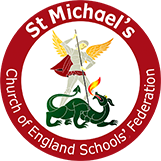Writing
Intent:
At St Michael’s Infant School, we aim to develop children into creative and independent writers who write for enjoyment and purpose. We intend to ensure all children understand how to write effectively for a range of genres, with audience in mind, using a wide range of skills to apply their knowledge.
Our aim is to provide children with key transferrable writing skills to build on year-on-year, that can be used and developed throughout each phase of their education and prepare them for secondary school. Writing is completed across all subjects of the curriculum and inspired by a range of exciting and engaging lessons or written texts. Providing children with varied reasons for writing, ensures that children are inspired to produce higher quality writing, but allows our learners to apply their skills to range of different contexts while also developing their independence. Writing across all subject areas will prepare our children for the junior school and the more in-depth approach to analysing, planning and innovating their writing. A focus is given to the skills of early writing in Reception, with the children building their resilience to be able to write for longer by the end of Y2.
Implementation
Writing is evident in all subject areas of our curriculum and a range of genres are taught through English lessons. The objectives of the National Curriculum are followed closely and have been embedded into St Michael’s writing progression document. This is to ensure the skills learned in composition, vocabulary, punctuation, grammar, and spelling are taught sequentially and that knowledge is embedded into memory to be applied independently in children’s writing. Lessons are planned so that skills are taught, modelled and experimented with before independent writing tasks are completed. Class discussion and ‘talk partners’ are used to support the teaching of writing. Through this, we aim to provide all the children may need in order to foster every child’s curiosity and creativity.
We aim to provide writing hooks to ignite children’s creativity with tasks that are inspired by lessons taught in the wider curriculum or through the text studied in ‘Book Club’ where reading skills are taught. This close link between reading and writing ensures children are given a language and text-rich curriculum and are encouraged to use a variety of interesting and adventurous language and writing styles in their own compositions. Children are expected to transfer their key topic knowledge and vocabulary into their writing and vice versa to transfer their spelling, grammar and punctuation knowledge into their topic work. We expect the high standards for writing in Literacy lessons to be evident within all of their work.
Using the ELS phonics programme, the sounds are embedded by the end of Y1 and spelling rules are explicitly taught in Y2. Children are given a range of activities in order to practise the phonics and spellings and then apply their knowledge to their independent written work.
We expect and encourage children to present their work neatly so handwriting skills are taught throughout the school.
Impact
Writing assessment is ongoing through every lesson through verbal feedback and class discussion; the lesson’s learning objective is also ticked when the objective has been met or achieved. Through verbal feedback and marking, pupils are given detailed responses and next steps in order to develop each child personally, and provide all children with opportunities to edit and improve their own compositions. Each term, teachers assess children’s independent writing against the National Curriculum objectives to infer their next steps, consolidate children’s understanding of specific objectives and challenge pupils to achieve even higher. The effective planning of the activities, targeted support and appropriate challenge in writing lessons ensures that all children are able to meet their full potential.
Pupil voice is used to enable class teachers and school leaders to assess the impact and enjoyment of writing across the curriculum. Self and peer assessment is also embedded into daily writing lessons from Y2 to give the children opportunity to review their own and other children’s writing, editing and improving writing based on next steps.
Phonics is assessed using the ELS programme in YR and Y1, once per term.
The senior leadership team closely monitors all children’s books and holds pupil progress meetings each term to monitor every child’s individual learning needs and progress in writing.
Progression Document
 St Michael’s C of E Infant School
St Michael’s C of E Infant School